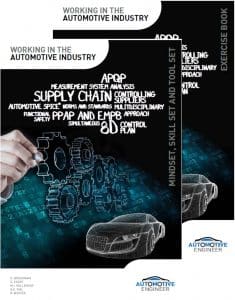Changes within the automotive industry are happening faster than ever before. Working in the automotive industry requires specific knowledge different from that in any other industry. Ensuring quality is an increasing challenge. Due to competition, there is constant pressure on costs, in a mass market increasingly confronted with the critical factor of “safety” in mechatronic systems and subsystems. For whom This 4-day course is aimed at both graduates with no or little experience within the automotive industry and employees who want to broaden their knowledge within the Automotive industry.
Objective The objective of this training course is to prepare participants for their first steps in the Automotive industry as an employee within the automotive and for employees working within an automotive company in one specific area, for example, to understand the broader framework of the automotive. This is achieved by teaching them the basic knowledge and required skills needed in modern automotive development and manufacturing processes. The training came about through research among large automotive organizations, which showed that starting engineers in the industry often lack the specific Automotive knowledge. The training includes 4 components:
- Introducing the Automotive industry
- Product and process development
- Production
- Continuous improvement
Materials The training provides a handout for each participant. Level MBO+/HBO Duration The training includes 4 days.
These take place over a period of 4 weeks (one day per week). Exam The training can be concluded with an exam (not included in the price). Attending all training days and successfully completing the exam leads to ECQA’s internationally recognized Automotive Engineer certificate. If the exam is not passed, you will receive a certificate of participation. Contents of training Below is an overview of the tools and topics covered during training 1. Introduction to the Automotive Industry Component 1 includes an introduction to the industry, covering genesis, industry development and future, the automotive supply chain and key terminology and challenges. The characteristics of the industry are discussed, particularly the supply structure, products and introductions and in relation to the importance of customer focus. Typical Automotive Engineer positions will be covered to help orient participants to specific interests. Another important element in this section is an introduction to the most important legal documents, laws, regulations and standards relevant to the industry. The section concludes with the importance and necessity of having processes and of process thinking in the industry. The increasing dominance of mechatronic subsystems in modern vehicles implies significant multidisciplinary challenges in engineering organizations and processes. 2. Product and Process Development The second part focuses on specific engineering aspects of product and process development in the Automotive industry. The section starts with an explanation of the product life cycle (product life cycle) and sustainability. The development phase of a product is explored in more detail by discussing the product development process (APQP) and related activities. System engineering is explained because of its specific importance in modern vehicles where system-level functions are implemented by various cooperating subsystems such as software, mechanics and electronics. “Functional safety,” a safe behavior of the subsystems in case of failure, is discussed in a module on risk management. This module also includes an introduction FMEA (Failure Mode and Effect Analyses), which is one of the most important methods of risk management at both levels, product and process, in the Automotive industry. 3. Manufacturing This third section deals with the automotive manufacturing process, focusing on quality assurance standards. It explains how to control the risks identified in the process FMEA. The main topics are process capability (CP and CpK) and process control (MSA) based on statistical tools. This involves discussing measurements, work instructions, training colleagues, intervening in a process that is not under control and contingency plans. Since suppliers play an important role in automotive development and the production process, it is essential to ensure the quality of the supplied products. For mechanical parts, this can be achieved by using tools such as PPAP and EMBP. To ensure the quality of systems with embedded software, the Automotive SPICE assessment framework is introduced. Changes made during the design or production phase can create risks. These must be identified, reviewed and approved before implementation. Tracking and recording is an important part of the product development process. 4. Continuous Improvement The fourth and final section deals with continuous improvement as a necessary component for the success of automotive development and the manufacturing process. The 8D Problem Solving method, well known within the industry, is introduced. Lean manufacturing is a systematic method of identifying and eliminating waste in a process. Other concepts, such as Kaizen, standardized work, Kanban and lessons learned, are discussed. Working in a team requires leadership. Working in international and multidisciplinary teams brings even more challenges. One of the learning elements is about quality awareness, leadership, cultural diversity and its influence.
 The training material was developed in close cooperation with major Automotive OEMs and suppliers. Experts, educators and trainers with extensive industry knowledge and experience are also involved. They were supported by the European Certification and Qualification Association (ECQA) and Lean Six Sigma Academy (LSSA). The materials include a manual containing all presentations, the theory book “Working in the Automotive Industry” and the accompanying exercise book. The theory book is available in both Dutch and English, the exercise book in English for now, but soon in Dutch.
The training material was developed in close cooperation with major Automotive OEMs and suppliers. Experts, educators and trainers with extensive industry knowledge and experience are also involved. They were supported by the European Certification and Qualification Association (ECQA) and Lean Six Sigma Academy (LSSA). The materials include a manual containing all presentations, the theory book “Working in the Automotive Industry” and the accompanying exercise book. The theory book is available in both Dutch and English, the exercise book in English for now, but soon in Dutch.